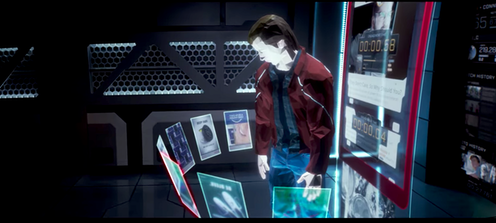
I recently watched the Netflix documentary, The Social Dilemma. It sent shivers down my spine. It focuses on how big social media companies manipulate users by building addiction into their platforms.
It was about 15 years ago when I first watched a group of young girls puffing up their cheeks and making fish faces while pointing a camera at themselves. I offered to take over the camera duty, and for the next 20 minutes, we created some of the most carefully manipulated photos I'd ever seen.
Every shot I took, they all ran over to the camera to edit. Next, they would alter their gaze, suck their stomach in and twist themselves into some very uncomfortable poses.
I laughed and suggested, just be yourself, stop trying so hard and just smile naturally into the camera. Eyes rolled, and they snatched their camera back. It seemed like the start of a significant craze that has swept across the country. What consumes many young people's mind today is looking polished, popular and poised on their social media feed.
I'm concerned.
When several times a day, you feel pressure to post poised photos of yourself online, you become vulnerable. First of all, it's not real. Most images are manipulations, not reality. If we are comparing our real lives to other peoples fake ones online, we will never feel good about ourselves.
Secondly, you are pandering to others( some of which are strangers) to get a sense of your self-worth. Inner strength does not come from outside sources. It may temporarily prop you up to have a photo that generates a lot of likes, but it trains you to look outside yourself for your sense of worth. Like Sean Parker, the Founding President of Facebook, suggests the social-validation feedback loop built into social media exploits vulnerability in human psychology. Facebook attracts 1.2 Billion users per day, and they spend an average of 90 minutes on the social platform. Facebook addiction looks similar in some ways on an MRI scan to substance abuse or gambling.
VULNERABLE. Happiness Hinged on Approval
I have seen people post a photo online and obsessively go back to see how much approval it generates. Their real-life is right in front of them, and they are more obsessed with looking good than experiencing it.
When you are a teenager, you are still forming your self-identity; if they are getting that from social media, it teeters on low self-esteem.
However, I understand. I have also fallen prey to social media's addictive nature. I find myself browsing other people's Instagram posts. Sometimes I feel pressure to "like" them just because I want to give them support. Also, there is an unwritten rule that if you like other people's posts, they will pay attention to yours.
Truthfully, when I post on Facebook, and I do find myself wondering who has seen and liked the post. I often go back and check. It can be addictive. When a post does garner support, I feel like I'm onto something. When it doesn't, I feel a bit deflated. What's wrong? Are people too busy to care about my life?
When the COVID virus hit, I found myself with a lot more time on my hands. I jumped to social media. I wanted to see how my keynote speaker colleagues were doing now that airports were shut down and live meetings cancelled. Suddenly everyone was doing online seminars, and keynote speakers started immediately promoting their abilities in this new arena.
Next, you saw a flood of keynote speakers bragging about the accolades they were receiving when they performed their speeches online. I followed suit and pompously flaunted my recent online successes.
Before COVID, I was using social media just to post photos of the speaking locations I travelled. Now, I was feeling a slight addiction. It may be a marketing strategy, but it didn't feel right.
After a couple of months, I realised social media was not my friend. It was exhausting watching other people flaunt themselves on social media. Somewhere in me, I felt I had to keep up. I was comparing my life to theirs.
I know it's not a real comparison online. Comparing your insides to someone else's outsides is dangerous. It hinges tediously on other people's approval. I've known this for years; self-worth, happiness, joy is all an inside job, you can't get it from anyone else. The more you try, the more you fall short. Social media is not self-affirming.
I eagerly watched the Netflix special, the Social Dilemma for answers to what seems like global self-esteem crumble. It explained the problem well. It even attempts to illustrate how this massive self-denial built into the platform with highly manipulated algorithms. But it doesn't provide concrete solutions, other than to limit social media exposure. Jaron Lanier goes so far as to suggest we delete all social media accounts.
I took some concrete steps to use social media instead of letting it use me:
1) I decided to post information that provides value predominately. It Includes useful tips, perspectives on life, information or quotes I like from books I'm reading or quips from the book I'm writing, Climb Outside Yourself. The whole book is about building self-awareness and inner strength, so I could use my own experience with social media to guide me. I do post photos of some of the places I visit or the food I eat at a great restaurant. Although I don't know that they provide value, they do seem to be the most popular. I think it's because its easier to support a photo of someone enjoying themself than to contribute to a conversation.
2) Anytime I post on social media, I ask myself, Am I posting this with the hopes of approval from others? If I am, I don't post it. Instead, I look for ways to add value and remove the temptation to try to look good. No carefully manipulated photos or bragging about how great my life is. I just don't think these posts make other people feel good and they don't affirm me either.
3) When I post something on social media, I won't go back and look at it for a full day. This way, I'm not searching the internet teetering on other people's approval. The shine of likes has been removed, and I can see things for how they are, not how I hope they should be.
4) I have specific time frames in my day that I browse social media. It's never during work hours, first thing in the morning or before I go to bed. The brain is susceptible to fake or anxiety-provoking information. It’s crucial to guard your energy and attention, especially at peak times. Social media can be draining and self-sabotaging, so carve out the times you are willing to go down that rabbit hole. Don't let it impact your productivity.
5) When I browse other social media feeds, I do tend to click the like button mindlessly. I'm torn about this. I want to show people my approval or support, especially if I think they need it. I know in the big picture it doesn't help them, but it may give them a temporary boost.
6) I deliberately put real relationship before social ones
7) From time to time, I go dark and take a total social media break. It's very relieving. I highly recommend doing this and notice how the break impacts your energy levels or productivity
I've found each of these steps has helped a lot. If you are at all concerned with social media negatively infiltrating your life, I suggest you implement some or all of them. Or, better yet, come up with your own. You know yourself better than anyone else. The more you look to outside sources for a sense of validation or answers, the further you go from yourself. You know what's best for you, nobody else does.
There is a lot of good in social media too.
There are some people, like my father, that I wish would be on social media. It would help me keep track of him.
I have many cousins, and we are all spread out, Liking or commenting on a post is an easy way to maintain a relationship, although it's not real, it shows support. Social media has helped me reconnect with long lost friends; it has helped me get business; it’s helped me connect with like-minded people.
When it comes to social media if we could just keep the good and leave behind the bad, however, I don't think it will ever be like that because it relies on advertising to keep it going. Every time we browse social media, someone is making money; usually, it's not you. Its provocative nature relies on your low self-esteem to perpetuate it.
Our best hope is to create parameters around our social media use. Use the platform, instead of letting it use you. What rules do you have for using social media?
You have to be real with yourself about how social media is impacting you. Nobody can do it for you and nobody will. As long as advertising is making people money online, the social apps, sites, likes and games will continue to propagate your life. Think twice about what you post online.


